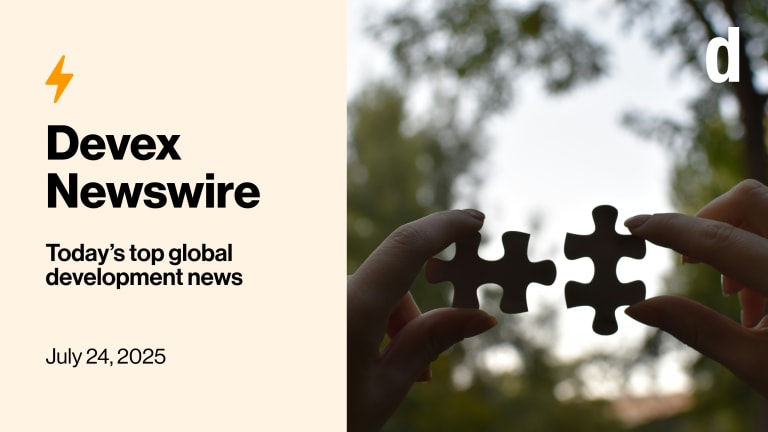Merge, adapt, or close? How might nonprofits respond to tough times?
For nonprofits that have seen their business models take a hit due to cuts to U.S. foreign assistance, there are several routes open. When is it appropriate to consider a merger or other form of joint working?
In recent months, the development sector in the United States has faced a “Permian extinction of benefactors.” That’s what James Mwangi, founder of Climate Action Platform, said in a recent Devex event, which discussed whether nonprofits should consider mergers and acquisitions. Mwangi was joined by three other panelists who have successfully merged or built other shared structures to look at the options available for nonprofits trying to survive the crisis. The need for mergers Both closures and mergers are inevitable, panelists told Raj Kumar, Editor-In-Chief of Devex, who hosted the event. “Our sector has been decimated by the dissolution of USAID. So many are in existential crisis,” said Carrie Hessler-Radelet, CEO of Global Communities, a nonprofit organization formed through a merger, and one that has now formed a group with several other entities. Hessler-Radelet said that many organizations that had lost USAID business were looking to merge to survive, but not all would find a way. “There are some that are just going to fold,” she said, “and I’m actually surprised that more haven’t folded yet.” Karl Hofmann, whose HealthX Partners acts as a holding company for two major nonprofits — PSI and the Elizabeth Glaser Pediatric AIDS Foundation — said that even before the recent events, funders had been pushing hard for more mergers to happen. “Like many organizations, PSI had explored merger conversations for some years,” he said. “We’re not deaf to all the signals that are coming from the funders and the entire ecosystem about how there needs to be more consolidation. There are too many players in the sector. There’s a lot of inefficiency that results from that.” Should you merge or share services? Panelists discussed how a full merger may not always be the best option. Three of the four panelists currently head up group structures, where organizations have kept their names and identities, and continued to deliver frontline services under their own brand, while sharing back office support. Often, a full merger brings major challenges, warned Daniel Speckhard, CEO of Corus International, a group of faith-based organizations including Lutheran World Relief and IMA World Health. Staff in different organizations may have very different cultures. Individual brands may be very valuable. He and other panelists highlighted many challenges that exist with a merger or other kind of consolidation. Who will form the board? Who will form the executive? Will there be redundancies? Will all services continue? What may happen to the offices? One of the key issues they focused on was the driving force behind this kind of agreement. If the idea was to reduce costs by sharing services, panelists said, it may not work out in the short term. While all agreed that there were potential cost savings, they also talked about how long it would take to align back-office systems such as HR, finance, and IT, and to standardize policies and procedures across multiple organizations. Shift your approach Panelists outlined a number of ways that you could shift your approach in the face of lost funding. One of the main approaches, Mwangi said, was to become more entrepreneurial, either by shifting to a client-focused approach in which services are sold to beneficiaries, rather than given, or by acquiring a social enterprise, which is already taking that approach. “As tends to happen in an organization that needs resources to maintain its momentum, the golden rule sets in,” he said. “He or she who has the gold makes the rules. And all of a sudden, the largest pool of viable gold that people can access is going to be in the hands of the very communities that have been getting served.” Panelists also discussed how this kind of model could build local expertise and shift power to the places where the work was done. But several panelists warned that it was not easy to quickly shift to a social enterprise mindset, or to build a model that made financial sense, preserved money, and left the beneficiary-turned-client at the center. While several speakers praised the value of the social enterprise mindset — and the added value that a large organization could bring to a small social enterprise — they also said it took years to build a sustainable social business, and even then, it was unlikely to throw off large amounts of cash to sustain existing models. One other model to consider, said Speckhard, was consultancy and advisory services, because often NGOs have large amounts of expertise. … Or close But the panelists also advised that organizations should think hard about winding down their services in an orderly fashion. “If you have a couple of months of operating run room, using it as a cash endowment for a social enterprise might be a good idea,” Mwangi said, “but you need to have a very clear sense of ‘what is it that you’re bringing other than that cash?’” “If it’s only that cash, then you really need to think about an orderly wind down and an onward granting of that cash without the institutional package.” Hessler-Radelet said she had expected to see more institutions novate their contracts — transfer them to a new entity so that projects and staff continued even as the parent entity wound down. But relatively little of this kind of activity had so far gone on, she said.
In recent months, the development sector in the United States has faced a “Permian extinction of benefactors.”
That’s what James Mwangi, founder of Climate Action Platform, said in a recent Devex event, which discussed whether nonprofits should consider mergers and acquisitions.
Mwangi was joined by three other panelists who have successfully merged or built other shared structures to look at the options available for nonprofits trying to survive the crisis.
This story is forDevex Promembers
Unlock this story now with a 15-day free trial of Devex Pro.
With a Devex Pro subscription you'll get access to deeper analysis and exclusive insights from our reporters and analysts.
Start my free trialRequest a group subscription Printing articles to share with others is a breach of our terms and conditions and copyright policy. Please use the sharing options on the left side of the article. Devex Pro members may share up to 10 articles per month using the Pro share tool ( ).
David Ainsworth is business editor at Devex, where he writes about finance and funding issues for development institutions. He was previously a senior writer and editor for magazines specializing in nonprofits in the U.K. and worked as a policy and communications specialist in the nonprofit sector for a number of years. His team specializes in understanding reports and data and what it teaches us about how development functions.








